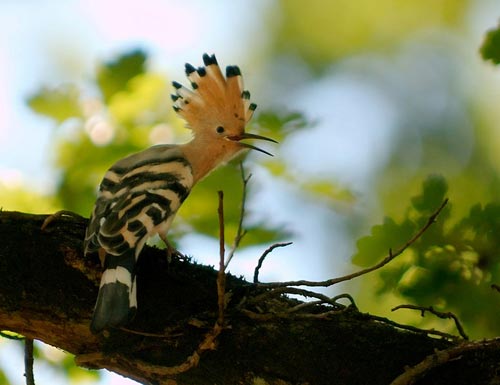-
Maltiisk orden
Malta 1987.10.26
In issue: Stamp(s): 4
Issued in: in list of 50 post stamp
-
Number by catalogue: Michel: 764 Yvert: 745 Scott: 692 Gibbons: 798
Perforation type: 14x14
Subject:
13 centov. The Hoopoe (Upupa epops)*. Bird on tipical maltese view
Additional:
*The Hoopoe(Upupa epops) is a colourful bird that is found across Afro-Eurasia, notable for its distinctive 'crown' of feathers.
The Hoopoe is classified in the Coraciiformes clade, a group that also includes kingfishers, bee-eaters, rollers, and wood-hoopoes (forming a clade with this one according to Hackett et al (2008)). In the Sibley-Ahlquist taxonomy, the Hoopoe is separated from the Coraciiformes as a separate order, the Upupiformes. It is the only extant member of its family, although what are now considered subspecies, such as the resident African form U. e. africana, were formerly sometimes given specific status. The Giant Hoopoe, U. antaios, lived on the island of St Helena but became extinct in the sixteenth century.
The Hoopoe is widespread in Europe, Asia, and North Africa, as well as Sub-Saharan Africa and Madagascar. It migrates from all but the southernmost part of its range to the tropics in winter.
The Hoopoe prefers open cultivated ground with short grass or bare patches, and spends much time on the ground hunting insects and worms. It is 25–29 cm long, with a 44–48 cm wingspan and a long, thin beak weighing 46-70 grams. This black, white and pink bird is quite unmistakable, especially in its erratic flight, which is like that of a giant butterfly. The song is a trisyllabic "oop-oop-oop", which gives rise to its English and scientific names.
The nest is in a hole in a tree or wall. Like those of its relatives, the kingfishers, the nest tends to contain copious amounts of faeces and smell very foul as a protection against predators.
Topics: Mills within the landscapes Windmills
-
Africa
- Algeria ⁄ 2
- Ascension Island ⁄ 1
- Cameroon ⁄ 1
- Cape Verde ⁄ 2
- Central African Republic ⁄ 1
- Ciskei ⁄ 1
- Cote d'Ivoire ⁄ 1
- Egypt ⁄ 1
- Equatorial Guinea ⁄ 1
- Ethiopia ⁄ 1
- Fernando Pó ⁄ 1
- Gambia, The ⁄ 1
- Ghana ⁄ 3
- Lesotho ⁄ 2
- Liberia ⁄ 1
- Mauritius ⁄ 1
- Mayotte ⁄ 1
- Morocco ⁄ 8
- Namibia ⁄ 2
- Niger ⁄ 1
- Reunion ⁄ 1
- Rhodesia ⁄ 1
- Senegal ⁄ 1
- Seychelles ⁄ 1
- Somalia ⁄ 1
- South Africa ⁄ 7
- South West Africa, SWA ⁄ 1
- Southern Rhodesia ⁄ 1
- Spanish Sahara ⁄ 1
- Tanzania ⁄ 2
- Transkei ⁄ 1
- Tunisia ⁄ 4
- Uganda ⁄ 2 America
- Anguilla ⁄ 2
- Antigua and Barbuda ⁄ 2
- Argentina ⁄ 4
- Aruba ⁄ 5
- Barbados ⁄ 4
- Bolivia ⁄ 1
- Brazil ⁄ 4
- British Antarctic Territory ⁄ 2
- British Virgin Islands ⁄ 1
- Canada ⁄ 5
- Chile ⁄ 4
- Costa Rica ⁄ 2
- Cuba ⁄ 1
- Curacao ⁄ 2
- Dominican Republic ⁄ 1
- Ecuador ⁄ 1
- El Salvador ⁄ 1
- Guyana ⁄ 1
- Jamaica ⁄ 1
- Mexico ⁄ 2
- Montserrat ⁄ 1
- Mustique island ⁄ 1
- Netherlands Antilles ⁄ 7
- Paraguay ⁄ 2
- Peru ⁄ 2
- Saint Vincent and the Grenadines ⁄ 3
- Saint Vincent and the Grenadines, Union Island ⁄ 1
- Suriname ⁄ 2
- Turks and Caicos Islands ⁄ 2
- United Nations. New York ⁄ 2
- United States of America ⁄ 7
- Uruguay ⁄ 9 Asia
- Aden ⁄ 1
- Armenia ⁄ 1
- Azerbaijan ⁄ 9
- Bahrain ⁄ 11
- Bangladesh ⁄ 1
- China, People's Republic of ⁄ 5
- Georgia ⁄ 1
- Hong Kong ⁄ 4
- India ⁄ 3
- Indonesia ⁄ 2
- Israel ⁄ 11
- Japan ⁄ 12
- Kazakhstan ⁄ 4
- Korea, North ⁄ 5
- Korea, South ⁄ 5
- Laos ⁄ 1
- Macau ⁄ 6
- Malaysia ⁄ 4
- Mongolia ⁄ 1
- Mountainous Karabakh, Republic of ⁄ 1
- Philippines ⁄ 2
- Singapore ⁄ 4
- South Arabia (Hadhramaut) ⁄ 1
- Sri Lanka ⁄ 2
- Syria ⁄ 1
- Taiwan ⁄ 7
- Tajikistan ⁄ 1
- Thailand ⁄ 1
- Turkey ⁄ 6
- United Arab Emirates ⁄ 2
- Vietnam ⁄ 1 Europe
- Alands ⁄ 12
- Albania ⁄ 3
- Alderney ⁄ 1
- Austria ⁄ 16
- Belarus ⁄ 15
- Belgium ⁄ 17
- Bosnia and Herzegovina. Croatian Adm. ⁄ 2
- Bosnia and Herzegovina. Muslim Adm. ⁄ 5
- Bulgaria ⁄ 4
- Croatia ⁄ 2
- Cyprus ⁄ 4
- Czech Republic ⁄ 12
- Czechoslovakia ⁄ 17
- DDR ⁄ 5
- Denmark ⁄ 21
- Estonia ⁄ 7
- Faroe Islands ⁄ 3
- Finland ⁄ 5
- France ⁄ 25
- French Andorra ⁄ 4
- Germany ⁄ 9
- Germany. The Soviet occupation ⁄ 1
- Gibraltar ⁄ 2
- Great Britain ⁄ 20
- Greece ⁄ 17
- Guernsey ⁄ 6
- Hungary ⁄ 5
- Iceland ⁄ 2
- Ireland ⁄ 2
- Isle of Man ⁄ 21
- Italy ⁄ 2
- Jersey ⁄ 12
- Kosovo ⁄ 1
- Latvia ⁄ 3
- Liechtenstein ⁄ 8
- Lithuania ⁄ 4
- Luxembourg ⁄ 8
- Malta ⁄ 11
- Moldova ⁄ 3
- Monaco ⁄ 8
- Montenegro ⁄ 1
- Netherlands ⁄ 51
- North Macedonia ⁄ 2
- Northern Cyprus ⁄ 2
- Norway ⁄ 3
- Poland ⁄ 9
- Portugal ⁄ 14
- Portugal. Acores ⁄ 7
- Portugal. Madeira ⁄ 3
- Romania ⁄ 12
- Russia ⁄ 5
- San Marino ⁄ 5
- Serbia ⁄ 2
- Slovakia ⁄ 7
- Slovenia ⁄ 13
- Sovereign Military Order of Malta ⁄ 7
- Spain ⁄ 28
- Spanish Andorra ⁄ 2
- Sweden ⁄ 21
- Switzerland ⁄ 6
- Transnistria ⁄ 1
- Ukraine ⁄ 21
- United Nations. Geneve ⁄ 3
- USSR ⁄ 11
- Vatican City ⁄ 2
- Yugoslavia ⁄ 6 Oceania
- Australia ⁄ 12
- Marshall Islands ⁄ 1
- New Caledonia ⁄ 3
- New Zealand ⁄ 6
- Norfolk Island ⁄ 1
- Palau ⁄ 1
- Papua New Guinea ⁄ 1
- Ross Dependency ⁄ 1
- Tonga ⁄ 2
- Wallis and Futuna ⁄ 4
- 2024 ⁄ 5
- 2023 ⁄ 6
- 2022 ⁄ 7
- 2021 ⁄ 6
- 2020 ⁄ 19
- 2019 ⁄ 18
- 2018 ⁄ 27
- 2017 ⁄ 20
- 2016 ⁄ 60
- 2015 ⁄ 14
- 2014 ⁄ 15
- 2013 ⁄ 19
- 2012 ⁄ 21
- 2011 ⁄ 31
- 2010 ⁄ 33
- 2009 ⁄ 39
- 2008 ⁄ 32
- 2007 ⁄ 26
- 2006 ⁄ 35
- 2005 ⁄ 24
- 2004 ⁄ 21
- 2003 ⁄ 12
- 2002 ⁄ 24
- 2001 ⁄ 19
- 2000 ⁄ 14
- 1999 ⁄ 17
- 1998 ⁄ 8
- 1997 ⁄ 14
- 1996 ⁄ 5
- 1995 ⁄ 8
- 1994 ⁄ 10
- 1993 ⁄ 10
- 1992 ⁄ 6
- 1991 ⁄ 4
- 1990 ⁄ 10
- 1989 ⁄ 11
- 1988 ⁄ 4
- 1987 ⁄ 11
- 1986 ⁄ 9
- 1985 ⁄ 8
- 1984 ⁄ 6
- 1983 ⁄ 9
- 1982 ⁄ 7
- 1981 ⁄ 7
- 1980 ⁄ 10
- 1979 ⁄ 6
- 1978 ⁄ 7
- 1977 ⁄ 4
- 1976 ⁄ 8
- 1975 ⁄ 9
- 1974 ⁄ 3
- 1973 ⁄ 8
- 1972 ⁄ 3
- 1971 ⁄ 5
- 1970 ⁄ 6
- 1969 ⁄ 4
- 1968 ⁄ 5
- 1967 ⁄ 8
- 1966 ⁄ 2
- 1965 ⁄ 2
- 1964 ⁄ 3
- 1963 ⁄ 2
- 1962 ⁄ 3
- 1961 ⁄ 5
- 1960 ⁄ 3
- 1959 ⁄ 2
- 1958 ⁄ 2
- 1957 ⁄ 4
- 1955 ⁄ 3
- 1954 ⁄ 2
- 1953 ⁄ 3
- 1951 ⁄ 3
- 1949 ⁄ 1
- 1947 ⁄ 1
- 1946 ⁄ 3
- 1945 ⁄ 1
- 1944 ⁄ 3
- 1943 ⁄ 1
- 1942 ⁄ 2
- 1939 ⁄ 2
- 1938 ⁄ 1
- 1937 ⁄ 1
- 1936 ⁄ 1
- 1934 ⁄ 1
- 1932 ⁄ 1
- 1923 ⁄ 1
- 1921 ⁄ 1
- 1920 ⁄ 1
- 1916 ⁄ 1
- Alphonse Daudet ⁄ 5
- Cattle mills ⁄ 9
- Children's toys ⁄ 9
- Don Quijote ⁄ 32
- Hydroelectricity ⁄ 37
- Industrial mills ⁄ 29
- Irrigation and water wheels ⁄ 55
- Manual and Kitchen mills ⁄ 31
- Miguel de Cervantes Saavedra ⁄ 24
- Mills in Art ⁄ 155
- Mills within the landscapes ⁄ 202
- Mortars and grinding stones ⁄ 22
- Olive oil and wine mills ⁄ 8
- Personalized stamps ⁄ 2
- Stylized mills ⁄ 155
- Sugar and salt mills ⁄ 21
- Various ⁄ 144
- Watermills ⁄ 225
- Wind pumps and farm windmill ⁄ 102
- Wind turbines ⁄ 273
- Windmills ⁄ 519



1987-s-logo.jpg)